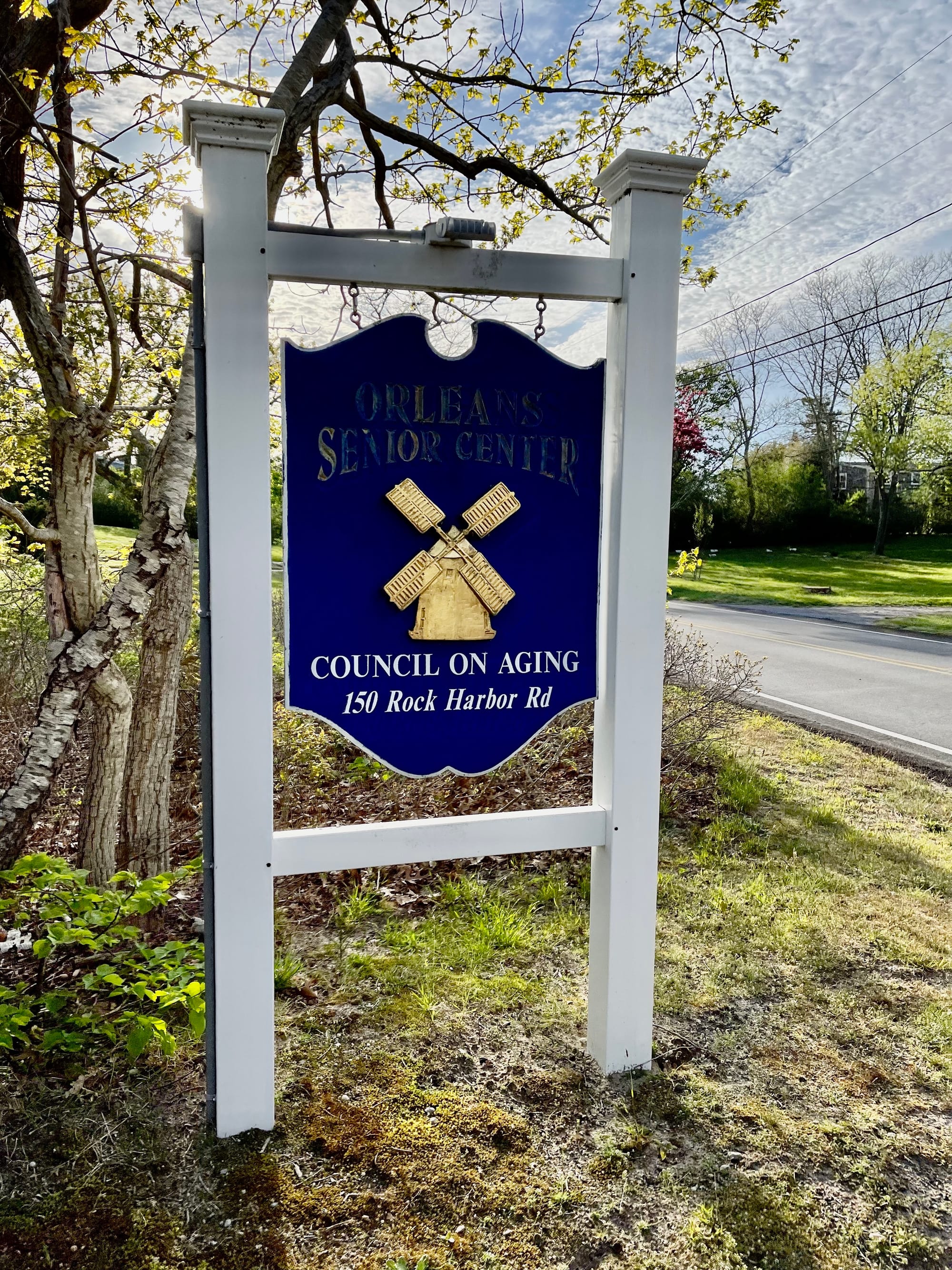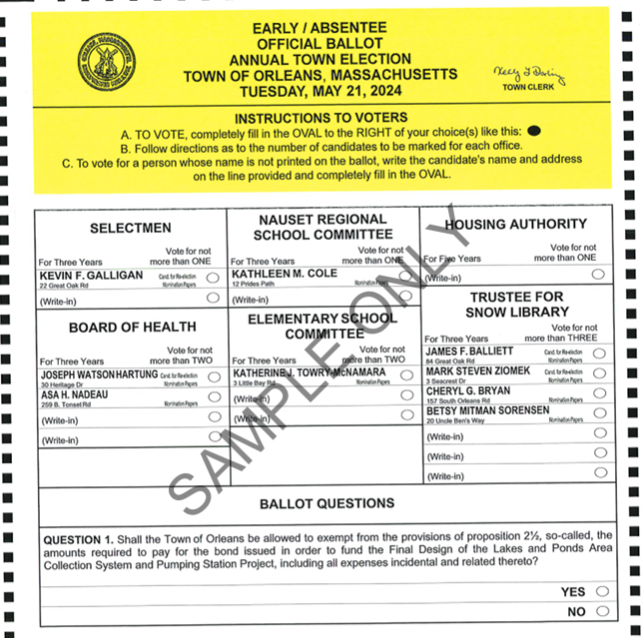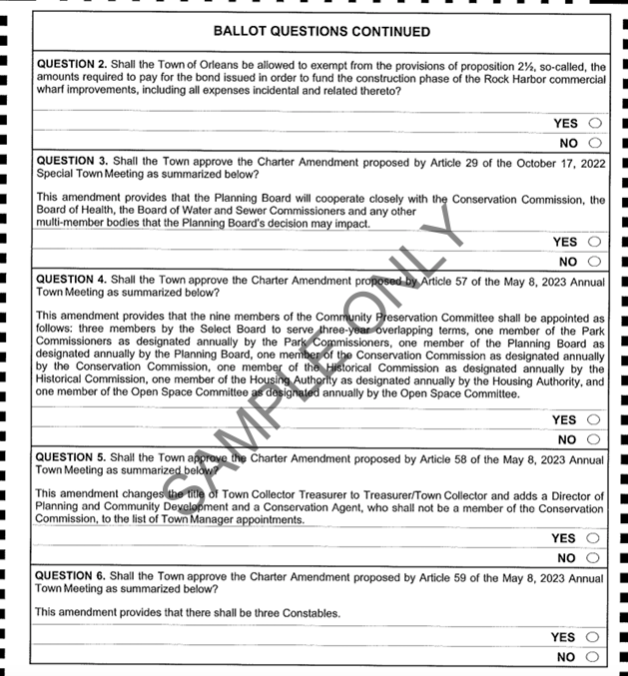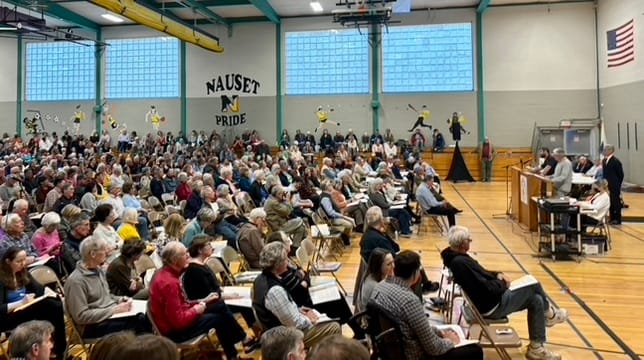Town Meeting is nothing if not unpredictable.
Despite a shorter, “streamlined” Warrant, and efforts made by Town Hall and the Select Board to make the meeting more efficient, it was a long night — almost five hours.
Attendance was high, with over 600 residents casting votes on the first several articles, and 226 hanging in ‘til the end.
The longest discussions took place around the Town/School Budget, the Capital Improvements Plan, the Community Preservation Act Budget, funding for Rock Harbor Commercial Wharf Improvements, the Affordable Housing Trust Fund, a feasibility study for a multi-use pathway to Nauset Beach, re-defining the town’s Early Education and Care Program, and changing the process for altering wetlands regulations.
A few themes emerged: concerns about budget increases and the higher property taxes that might follow and confusion over how some Warrant articles were presented (most notably with Articles 37, 42 and 49, described below).
The audience became audibly frustrated at times by the meeting’s duration — in particular, at overly long explanations and speeches, especially those regarding articles that clearly had plenty of support.
Kudos to all the residents who attended and special props to those who made it ‘til 11pm.
Our Quick Recap:
Town/School Budget: Increased spending dominated the 24-minute conversation about Article 13. Finance Committee Chair Nick Athanassiou opened the discussion with a short speech representing the seven committee members who voted in support of the article, saying that, despite concerns about how the Nauset Regional School District budget is created — and when — and the need to “diversify the funding” of town projects, they were satisfied that the FY 25 Budget had been “thoughtfully put together.”
Representing the Finance Committee’s two abstaining members, Ed Mahoney advised residents against “rubber-stamping” increased spending. Town Manager Kim Newman spoke next, explaining that overall spending appears to have increased more than it actually has: ten items that were previously voted on separately, as stand-alone articles, are now included in the operating budget. Other drivers of the larger budget include higher costs for property insurance, health insurance, retirement obligations, debt service, set-asides for union negotiations and the Finance Committee Reserve Fund, and increases in the cost of water and chemicals. (See EXIT 89’s preview for a deeper dive on the budget.) The article passed easily, 422-155.
Capital Improvements Plan (CIP) Article 14: Here again, residents worried about spending, even though the CIP is non-binding, and a required planning document that helps Orleans anticipate expenditures in the coming five years. Once again, members of the Finance Committee spoke about their split vote. Nick Athanassiou again represented the eight Finance Committee members who voted to support the CIP. He talked about how the Long Range Capital Planning Committee is now working to plan for expenditures 20 years ahead, not just five. Ed Mahoney, the Finance Committee’s single “No” vote, spoke for a longer stretch, describing the 18 projects outlined in the CIP as “reasonable on a stand-alone basis,” but the debt they’d incur would require additional property taxes and reduce the town’s fiscal flexibility. After 18 minutes of discussion, residents approved the CIP, 420-187.
Community Preservation Act Budget — Article 15: This budget comes up for Town Meeting approval every spring and usually passes quickly. Not this year. The 14-minute discussion meandered from confusion about the budget’s funding source and a show of enthusiasm for specific projects to a valid, if non-topical, complaint that the Academy Playhouse, designated for preservation-related support, is not easily accessible for the disabled. (See EXIT 89’s preview for an explanation of how the funding works.) Voters approved the article 536-72.
Rock Harbor Commercial Wharf Improvements — Article 17: The discussion lasted 27 minutes, the second longest of the night, with resident after resident expressing strong support for the $9 million project and for the cultural and economic value that commercial fishing brings to Orleans. Only one resident spoke against the article, which ultimately passed 575-24.
The Affordable Housing Trust Fund (AHTF) — Article 26 was the only failed article of the night, and something of a surprise. After Orleans Select Board member Meff Runyon introduced it, Nick Athanassiou spoke on behalf of the majority of the Finance Committee, saying that despite there being “room for improvement” in the direction of the Affordable Housing Trust Fund Program, there is “no doubt that the Finance Committee is in complete support of affordable housing,” and that “we should not reduce the steady funding of this board without considering the implications of putting the brakes on a sustained effort.”
He was followed by his Finance Committee colleague, Lynn Bruneau, one of two negative votes (and an advisor to EXIT 89), who listed each of the town’s contributions to Affordable Housing since 2016, and said “the need for workforce housing is catching up.” (Currently the AHTF is designated to fund only “Affordable” housing, which is restricted to individuals and families making up to 80 percent of Area Mean Income, or AMI.) Bruneau urged voters to “wait and see” whether a petition to the State Legislature succeeds — a change that would allow the AHTF to support “Attainable Housing” as well — available to those making up to 200 percent of the AMI.
Alan McClennen, Chair of the Affordable Housing Trust Fund Board, referred to the board’s many accomplishments, including the 75 new Affordable units underway so far and the fact that Orleans is track to become the first Cape town to pass the State-mandated 10 percent Affordable Housing threshold. He also described how the board has successfully leveraged its funding to create housing in a very expensive building climate. After nearly 22 minutes of discussion, voters rejected the article, 341-166.
A Multi-Use Pathway to Nauset Beach — Article 33: Seventeen residents spent just shy of 27 minutes commenting on this proposal, which requested $85,000 for a feasibility study. “We envision an unobtrusive path that fits with the character of Orleans,” said Alice Thomason Van Oot, Chair of the Transportation & Bikeways Advisory Committee. Many residents, including several Beach Road property owners, spoke in support of the study. Two Beach Road residents expressed strong opposition, fearing a path would detract from the beauty of the area and negatively affect their properties. (See EXIT 89’s preview for more on this article.) The article passed 332-69.
Orleans Early Education and Care Program — Article 37: Maybe it was the late hour, but confusion and suspicion characterized the discussion. Some speakers expressed concern — and some indignantly — that the town was seeking to control educational “content” for young children, despite repeated assurances to the contrary. Gail Briere, Chair of the Orleans Elementary School Committee, explained that the article is an effort to expand services. Committee member Sasandra Richardson Roche identified herself as the article's author and described the program as “funding to help families get better childcare, more childcare, get their kids into preschool, and get after-school care” — nothing more. The article passed, 210-73.
Real Estate Transfer Fees and Seasonal Communities Designation — Article 42: Here again, confusion reigned. Of the shrinking number of voters still present, not many seemed to understand what the article was actually proposing. Was it instituting a new tax? Would it go to Affordable Housing? But, wait, hadn’t we just voted not to support Affordable Housing? Speaking for the six Finance Committee members who voted to support the article, Richard Messina encouraged voters to “show non-binding support of a local-option transfer fee that would assist in funding Affordable and Attainable housing without adding more pressure to you, the taxpayer.” Chris Kanaga, representing the Finance Committee's three negative votes, said “the idea that we would add another tax to the burden of the taxpayers was abhorrent to some of us.” Several speakers expressed opposition to any new taxes at all. Alisa Magnotta, CEO of Housing Assistance Cape Cod (HAC), explained that the article was simply a show of support for pending State legislation that, if passed, would allow Orleans to set its own parameters for a transfer fee. She also noted that it could be a revenue source for Attainable Housing, which residents have said they support. It passed narrowly, 150-127.
Six Zoning Bylaw Changes — Articles 43-48: Designed to ease the creation of housing in Orleans, the changes that would allow greater housing density in the business district inspired the most discussion. Some questioned whether these changes could cause Orleans to become overbuilt and too densely populated. Orleans resident Peter Haig, an architect, described these as a “great suite of bylaw changes” brought forward by the town, and “strongly urged support.” The article passed, 222-32.
Wetlands Bylaw Changes — Article 49: The last, but in no way least. Two hundred twenty-six dedicated if weary residents listened to 40 minutes of discussion about this article, a Citizen’s Petition seeking to change how wetlands regulations are amended. Things got off to an unusual start when Town Moderator David Lyttle recused himself from the podium and the meeting elected a temporary replacement — because Lyttle, a professional land surveyor, was the citizen behind the petition. In his view, informed by what he described as decades of experience in Conservation Commission meetings and hearings, ”changes to the wetlands bylaws should require the same level of review as zoning bylaw changes do.” The current process, he said, “flies under the radar of most residents.”
The Select Board had unanimously voted against the petition but did not offer an explanation. The Finance Committee was divided — 4 in favor, 5 against. Member Chris Kanaga, supporting the petition, echoed Lyttle’s points. Committee Chair Nick Athanassiou, speaking against the petition, said their objections were to the process by which the article arose, not necessarily its content. “The petitioner’s well-meaning ideas need to be aired through a thorough public process,” Athanassiou said, “before being presented for Town Meeting vote.” Drusy Henson, Chair of the Conservation Commission, expressed the view that no change was required, that everything the commission does is fully transparent, and that if the process by which they operate is changed in this way, it could lead to extensive and confusing changes for the rest of the town’s boards.
A total of 19 speakers weighed in. Many residents expressed gratitude for the work of the Conservation Commission, while others expressed frustration at restrictions it had imposed on residents' properties, including aesthetic ones, such as its prohibition against white trim on certain homes. Other residents asked why the Conservation Commission is allowed to write its own regulations. Virginia Farber, a Conservation Commission member, pointed out that Board of Water and Sewer regulations are changed by exactly the same process as Conservation Commission regulations, and that the Conservation Commission last changed a regulation in 2019. The article passed, 129-98.
Want to Know More?
- To watch a recording of the entire Spring Town Meeting — we suggest 1.52x speed — click here.
- For the Cape Cod Chronicle recap of Town Meeting, click here.
- To head to EXIT 89’s Town Meeting Preview, which explains these articles in more detail, click here.

Vote Tomorrow!
Our Annual Election – paper ballots, voting booths! – is tomorrow, Tuesday, May 21, 9:00 AM - 7:00 PM at the Council on Aging/Senior Center. Along with 6 questions concerning overrides and Charter Amendment proposals, we’ll be voting to fill:
- 1 Select Board seat
- 2 Health Board seats
- 2 Orleans Elementary School Committee seats
- 3 Snow Library Trustee positions
- 1 Housing Authority seat
- 1 Nauset Regional School Committee position
For a sample ballot, see photos below, or click here.


Want to Become Involved?
- For a list of Town committees that need members, click here.
- A Citizen Interest Form can be found here.

EXIT 89 is an independent publication. Our mission is to help Orleans voters make sense of town issues by providing a clear and impartial overview of the latest developments. We want to help fill the current information gap, reduce the "mystery" of Town Meeting, and promote vibrant civic engagement.
Our hyperlocal digest is researched and written by journalists Martha Sherrill and Emily Miller. Elaine Baird and Lynn Bruneau are the founding advisors. Editing, infographics and tech support are provided by Kazmira Nedeau of Sea Howl Bookshop. We are all residents of Orleans.
Our digest is 100% free — and we aim to keep it that way. With Lower Cape Television (LCTV) — a 503(c)(3) — as our fiscal sponsor, all contributions are now tax deductible. Donations by a check made out to "EXIT 89" will save us a processing fee. Please send these to: EXIT 89, P.O. Box 1145, Orleans, MA 02653. To donate online, click here.
As always, we’d love to hear from you. Readers have enriched our understanding of Orleans — and sharpened our focus. Please share questions, comments, and ideas for future issues at hello@exit89.org. And if you are new to EXIT 89 take a moment to sign up for a free subscription.

